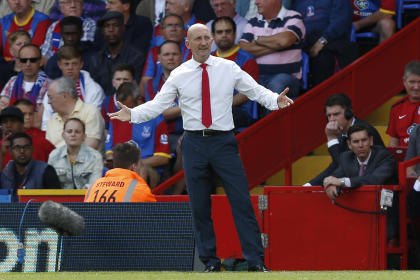English coach says national team should start taking cues from U.S.
For complete World Cup 2014 coverage visit Yahoo Sports and follow @YahooSoccer
RIO DE JANEIRO – These are truly odd times in soccer and here is the ultimate proof.
England, the nation that claims to have invented the modern game and has long nursed an insufferable superiority complex related to that fact, believes it has a lot to learn, from, wait for it … the United States.
The Jurgen Klinsmann-led U.S. World Cup campaign ended nearly a week ago but still tributes are pouring in. Mainly, incredibly, from the country that was derisive enough about American soccer ability that just four years ago its media mocked the "Yanks," urging its own national team to win "the Soccerball World Series" when the sides met in South Africa.
Not anymore. Not after England flamed out of this tournament in timid fashion, collecting just a single point from Group D and suffering guaranteed elimination after just two games.
"The Americans can now teach us a thing or two about the game we invented," wrote English coach Ian Holloway in the Daily Mirror. "We used to laugh about the failure of our American cousins to fall head over heels in love with the beautiful game.
"But they have made great strides and given the size of the country and the athletic and financial resources at their disposal it is only a matter of time before they produce a team to lift the World Cup. Watch out, the Yanks are coming."
Perhaps it is not surprising that England is down on its own national team following its woeful performance, but why is it that the U.S. is the lucky target of such effusive praise?
After all, while the run through the Group of Death and to the round of 16 from Klinsmann's men was highly commendable, defeat to Belgium at that stage ensured the summer did not go down as an overwhelming success.
The answer could lie in the heart and desire shown by Klinsmann's squad. The U.S. was not blessed with great individual talent but showed fighting spirit and determination, two characteristics that England and its public hold dear.
"Talk about dying with your boots on," gushed Holloway, who is currently manager of Millwall in the second tier English Championship, a former English Premier League coach with Blackpool and Crystal Palace, and a regular media pundit.
There is no doubt Klinsmann's reputation has been boosted over the past few weeks, even with the Americans winning one, tying one and losing two of its matches in Brazil.

Earlier in the week, London's Daily Telegraph newspaper went so far as to suggest that England should dump its incumbent coach Roy Hodgson and lure Klinsmann instead. Good luck getting the German to swap his beachside home in Southern California for wet and blustery London though.
"Klinsmann is the ideal candidate," wrote columnist Luke Edwards. "He has shown with both Germany and the U.S. that he makes [the] national team perform better than the individuals within it."
Even though it takes place over a single month once every four years, the World Cup is the most powerful force in soccer in terms of determining the reputation of a player, or a team. Rightly or wrongly, at the current time, the U.S. has a level of international respect that is surely higher than at any other period in its history.
All this will come as a shock to some. There are still plenty of fans of soccer in the U.S. who love nothing more than to pour scorn on both the national team and Major League Soccer, presumably in an attempt to make themselves sound knowledgeable. Increasingly, even internationally, those opinions are isolated.
Whether soccer in the U.S. is really in a position to start "teaching lessons" to more established soccer countries, as Holloway suggested, is debatable. However, the gulf between American soccer and Europe, while still significant, is clearly no longer seen as being quite such a chasm.


